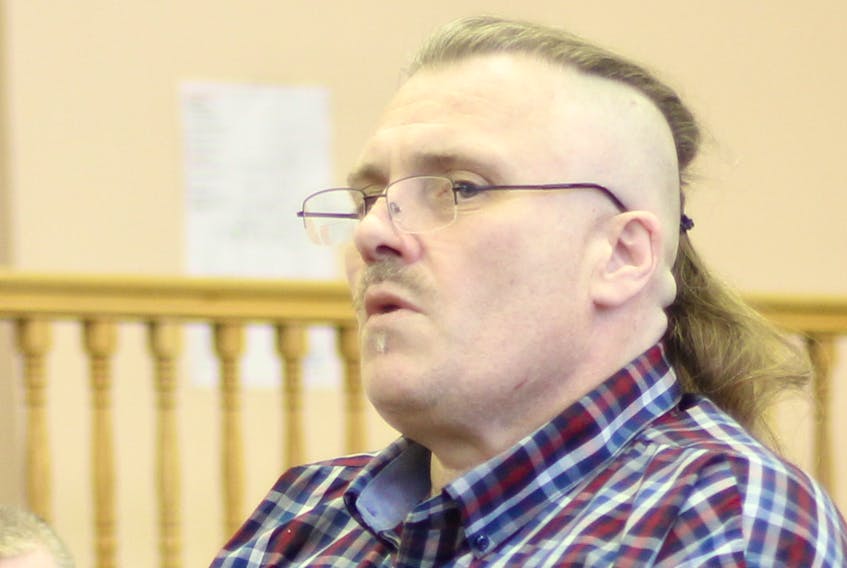Allan Potter had no choice but to kill Dale Porter in his driveway in the early morning hours of June 29, 2014, his lawyer told the court Monday afternoon.
In the courtroom gallery, Porter's family members shook their heads and sobbed.
"What shred of evidence is there that Mr. Potter was not defending himself? I say not one shred. Not a shred. No evidence at all," Randy Piercey said to the jury in Potter's murder trial. "Not one witness besides Mr. Potter was able to tell you what happened. There's no reason to reject his evidence.
"I'm suggesting Mr. Potter had absolutely no choice but to do what he did, and there is not one shred of evidence that he had any other choice in this case, so I'm asking you to find him not guilty."
Piercey was the first to present his closing arguments in the murder trial, pointing out to the jurors that in order to convict him of murder they have to be completely certain Potter had not acted in self-defence.
"What shred of evidence is there that Mr. Potter was not defending himself? I say not one shred. Not a shred. No evidence at all." — Defence lawyer Randy Piercey
Potter, 55, has pleaded not guilty to murdering Porter by stabbing him to death in Porter's North River, Conception Bay North, driveway after a night out. Porter, 39, was a fisherman, a trucker and a father of two.
Piercey also reminded the jury that the information they had heard during the three-week trial about Potter's lifestyle and criminal record — which may have seemed shocking or "like a novel" at times — could not be considered as evidence or found to have bearing on his guilt or innocence. This character evidence had been presented, Piercey said, only as part of conversations recorded by undercover RCMP officers and played in court.
Though the Crown had called close to three dozen witnesses, the most important evidence came from three in particular, Piercey said: Potter himself, an undercover Mountie playing the lead role in a "Mr. Big" operation and a former Vikings Motorcycle Club member who was an agent for the police, and who was paid $150,000 to try to get information on Potter's involvement in Porter's death. Potter is also a Vikings member.
"I wouldn't believe a word (the agent) said to you," Piercey told the jury. "All he had to do to keep that salary was not contact his wife, whom he was accused of beating up. He could not do that, and that speaks volumes about the man."
The Viking-turned-agent testified Potter told him that he had killed Porter because Porter had disrespected the motorcycle club. The agent also said he had been present a week or so after Porter's death when the club president had thrown a black-handled knife — which the agent recognized as Potter's — into the ocean near Cape Spear.
A second Viking, who also became an agent for the police, was tasked with wearing a hidden recording device during conversations with Potter on dozens of occasions, but never obtained a confession from him, Piercey said.
"Mr. Big is a red herring." — Piercey
Piercey said most of the Crown's cross-examination of Potter's testimony focused on information provided by the undercover RCMP officer who had posed as the operator of a debt collection service and had offered Potter a job. Potter had agreed to help him and two other undercover Mounties move what Potter was told was a dead body stuffed in a hockey bag from a cornfield to a fresh grave in a cemetery. The court heard audio recordings of a number of conversations between Potter and the officer that day.
"Mr. Big is a red herring," Piercey said. "You can't convict someone on the basis of what they did or did not say to a police officer in those situations where they thought they were dealing with a murderer."
Potter had told the undercover officer he had stabbed Porter, Piercey pointed out, in a stressful situation after he had helped move the "body." Piercey, who is representing Potter along with co-counsel Jon Noonan, acknowledged Potter had not mentioned it was in self-defence.
"His only explanation for not telling the full story to (the undercover officer) was that he wanted to make himself look tough," Piercey said. "Mr. Potter just wanted to get a story out to help himself, and he didn't want to go into details. Does the fact that he didn't tell (the officer) everything mean that he was lying to you?"
Piercey also brought up a knife entered as evidence by the Crown. It had been found by a member of the public in a roadside brook in Brigus, not far from the Vikings clubhouse, and Potter testified he believed it was the one Porter had used to attack him. No fingerprints or DNA was found on the knife.

"The Crown entered it, we didn't," Piercey said, saying prosecutors had not presented any significance for the knife.
Prosecutor Sheldon Steeves began his address to the jurors by asking them to convict Potter of first-degree murder.
"We didn't know when we started this that Mr. Potter would admit that he killed Dale Porter," Steeves said of himself and fellow prosecutor Erin Matthews. "He claims that he acted in self-defence. (Piercey) would have you believe that the version (Potter) gave you is the true version. The Crown submits that the version he gave the (undercover officer) is the true version, that Mr. Potter concocted the story because he needed a way out after having confessed and admitted his role in the murder of Dale Porter.”
Steeves suggested the knife found in the brook had nothing to do with Porter's murder, since Porter had not used a knife the night he was killed. To prove his point, Steeves held up a photo taken at Porter's autopsy, showing his hand with a stab wound on the palm. The knife had entered the palm and exited the back of the hand, the court heard during the trial from the medical examiner, who had deemed the wound defensive.
"If Mr. Porter's hand was open, not closed, is that consistent with someone holding a knife?" Steeves asked the jury. "Even if you were inclined to believe Mr. Potter was defending himself, look at the number of wounds."
Porter had been stabbed 17 times and had four slash wounds, as well as a number of blunt force injuries.
Steeves brought up the fact that Porter's DNA had been found in stains on a hoodie belonging to Potter as well as in the taxi Potter had taken from Porter's house that night.
When it came to the first Viking-turned-agent, Steeves acknowledged some credibility issues, but pointed out the agent's testimony about having seen Potter's black-handled knife go into the ocean was consistent with what Potter had told the undercover officer before his arrest.
Steeves scoffed at the idea that Potter had given the undercover officer a false confession out of fear, and reminded the jury that Potter had been unable to recall much about his conversations with the officer, though he had been able to explain the events of the night Porter died in great detail.
"Do you recall any evidence of fear that he exhibited in the (audio recording from the car)? Do you recall any evidence of threats? Of any inducements? Mr. Potter said up front, their relationship was all about trust and brotherhood. That's why he confessed to (the officer)," Steeves said, adding that Potter and the officer had bonded over the moving of the "dead body."
"He was so unfazed, he was actually singing Alice Cooper's 'Welcome to my Nightmare.' Does any of that suggest he was scared or fazed by anything that was going on around him?"
Justice Garrett Handrigan will give his instructions to the 13 jurors Tuesday morning before 12 of them are sequestered to begin their deliberations on a verdict. One juror will be chosen at random and dismissed, since the court had opted to select more than the required dozen jurors at the start of the trial.
Twitter: @tara_bradbury
RELATED









